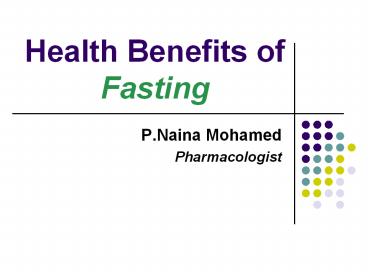Health Benefits of Fasting - PowerPoint PPT Presentation
Title:
Health Benefits of Fasting
Description:
Various health benefits of Fasting are dealt in this presentation. – PowerPoint PPT presentation
Number of Views:6764
Title: Health Benefits of Fasting
1
Health Benefits of Fasting
- P.Naina Mohamed
- Pharmacologist
2
Introduction
- Abstinence from food and liquid for a defined
period, is termed as Fasting. - Research suggests there are major health benefits
to fasting or caloric restriction such as - Reduced risks of
- Diabetes,
- Insulin resistance
- Cardiovascular diseases
- Cancer
- Slowing of the aging process
- Increase maximum life span
- Detoxification
- Rest to digestive system
- Resolves inflammatory response
- Helps to overcome Addictions
3
Reduction of Blood Sugar
- Fasting
- Decrease in food intake
- Reduction of insulin secretion
- Increase in insulin sensitivity
- Reduction of blood sugar level
- Reduce the risk of Diabetes
4
Weight loss
- The first response of the body to fasting is
break down of glycogen. When the stores of
glucogen are exhausted, break down of fats to
release energy begins. The fats stored in kidney
and muscles are broken down to release energy. - Fasting
- Breakdown of fats
- Release of ketone bodies
- Reduction of fat stores
- Weight loss
- Reduce the risk of Cardiovascular disease
5
Correction of high blood Pressure
- Fasting
- Reduce the risk of atherosclerosis
- Reduce Metabolic rate
- Reduce adrenaline and noradrenaline
- Steady metabolic processes
- Reduction in blood pressure
6
Neuroprotection
- Fasting
- Breakdown of fats
- Increased production of ketone bodies
(ß-hydroxybutyrate) - Protective effects including neuroprotection
- May be helpful in seizures, Alzheimer's and
Parkinson's diseases
7
Cancer
- Fasting
- Reduction in glucose and insulin-like growth
factor 1 (IGF-I) levels - Reduce oxidative stress and inflammation in cells
- Prevent and repair DNA damage
- Reduce the risk of cancer
8
Cancer
- Fasting
- Suppress growth and reproduction
- Divert the energy towards cellular maintenance
and repair - Maximize the chance of survival
- Reduce the risk of Cancer
9
Increase life span
- Fasting slows the little clocks that tick inside
our mitochondria - Slows aging
- keeping our organs youthful
- Increase life span
10
Detoxification
- Processed foods contain lots of additives. These
additives may become toxins in the body. Some of
them promote production of advanced glycation end
products (AGEs). Most of these toxins are stored
in fats. - Fasting
- Burns fat
- Release of toxins stored in fats
- Removal of toxins by Liver and Kidney
- Detoxification
11
Rest to Digestive System
- Fasting
- Rest to digestive organs
- Production of digestive secretions at reduced
rates - Helps to maintain balance of fluids in the body
- Breakdown of food at steady rates
12
Resolves Inflammatory Response
- Some studies, show that fasting promotes
resolution of inflammatory diseases and
allergies. - Fasting
- Resolves inflammatory response
- May help to resolve rheumatoid arthritis,
arthritis, psoriasis and ulcerative colitis
13
Promotes Healthy diet
- Fasting
- Reduces craving for processed foods
- Promotes desire for natural foods, especially
water and fruits - Healthy lifestyle
14
Help to Overcome Addictions
- Fasting
- Reduce cravings, for nicotine, alcohol, caffeine
and other substance abuse - Resolve addictions
15
Demerits
- Fasting
- Dehydration
- Headaches (even trigger migraines in predisposed
persons) - It may worsen heartburn and peptic ulcer.
- Pregnant women, nursing mothers, malnourished
people, and individuals with cardiac arrhythmias,
renal or liver problems are advised not to fast.
16
References
- Harper's Illustrated Biochemistry, 29eRobert K.
Murray, David A. Bender, Kathleen M. Botham,
Peter J. Kennelly, Victor W. Rodwell, P. Anthony
Weil - Endocrine Physiology, 4ePatricia E. Molina
- Gastrointestinal PhysiologyKim E. Barrett
- Principles and Practice of Hospital Medicine
Sylvia C. McKean, John J. Ross, Daniel D.
Dressler, Daniel J. Brotman, Jeffrey S. Ginsberg
17
References
- http//jap.physiology.org/content/99/6/2128.full
- http//stm.sciencemag.org/content/4/124/124ra27.fu
ll.html - http//link.springer.com/article/10.1007/s10943-01
3-9687-0 - http//impactaging.com/papers/v1/n12/full/100114.h
tml - http//www.nature.com/onc/journal/v30/n30/full/onc
201191a.html - http//www.ncbi.nlm.nih.gov/pmc/articles/PMC156352
/

